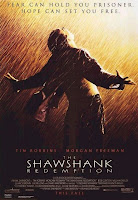I recently endured my first cold of the season. The sore throat and the runny nose passed relatively quickly, leaving me in the niggling cough stage. A few nights ago, while sitting in an acting class, I felt a potentially disruptive coughing fit simmering just under the surface, so in an attempt to minimise the disruption, I instead released a short, sharp and perhaps oddly high-pitched hack. To my surprise, the girl sitting next to me kindly whispered, "Bless you," seemingly unaware that my audible expulsion was not, in fact, a sneeze. Not wanting to be unappreciative or rude, I let her error pass. However - and here comes the neurotic part - rather than risk another awkward blessing of a cough, I made a conscious effort henceforth to make my splutters sound more cough-like by invoking at least two or three distinct barks in rapid succession. Yep, I actually adapted my own coughs in order to avoid an embarrassing situation. Coincidentally, the monologue I had prepared for class that night was written by Woody Allen.
Yesterday, I undertook the epic task of watching an epic film nominated for Best Picture in 1962...

Lawrence of Arabia
Director:
David Lean
Screenplay:
Robert Bolt and Michael Wilson
Starring:
Peter O'Toole, Alec Guinness, Anthony Quinn, Jack Hawkins, Omar Sharif, José Ferrer, Anthony Quayle, Claude Rains, Arthur Kennedy, Donald Wolfit
Academy Awards:
10 nominations
7 wins, including Best Picture and Best Director
We are introduced to T.E. Lawrence (O'Toole) on his motorcycle speeding down a quiet country road. Suddenly, he swerves to avoid hitting a couple of meandering bicyclists, fatally crashing into the adjacent greenery. Yep, he's dead within the first five minutes of the film. But don't let that fool you. There's at least three and a half hours to go.
Flashback to about twenty years earlier and young Lt. Lawrence is stationed in Cairo during World War I. The other British Army officers don't take him too seriously, but his knowledge of the desert-dwelling Bedouin people is enough for his superiors (Wolfit and Rains) to send him to meet with Prince Faisal (Guinness). While crossing the desert, Lawrence's guide is killed by a feuding tribe member, Sherif Ali (Sharif), unhappy with the guide's use of his well. Lawrence survives on his own, eventually reaching Faisal. Defying his orders, he recommends a battle plan to the Prince in his fight against the Turks, which involves more desert crossing and working alongside Ali and yet another feuding tribe member (Quinn), who is also protective of wells. Through a few more battles and a few more desert crossings, Lawrence gradually develops a fondness for these nomadic people who, in turn, begin to reciprocate his respect.
To be perfectly honest, it is hard to explain what I like about Lawrence of Arabia. Sure, it is a fascinating study of a complex man. Sure, the script is eloquent and expressive. Sure, Peter O'Toole is engaging in the title role. But I'm not entirely sure I noticed any of those things while I was watching the film. For the fact is this picture is so incredibly epic that all those other elements seem to almost fade away. The epic landscapes. The epic battles. The epic duration. It's hard not to be genuinely impressed by the epic feat it must have been to get this film made.
.jpg)
The locations alone are spectacular to behold - a vast expanse of desert as far as the eye can see. Freddie Young's Oscar-winning cinematography is beautiful yet simple. Although, when it comes to stunning exterior shots, I've often wondered how much credit should go to the cinematographer and how much to the location itself. I mean, if nature presents you with breathtaking views, all you need to do is point the camera and shoot, right? But, obviously, I am rather offensively simplifying the cinematographer's art. Either way, the visuals are moving and effective. And considering the number of times that the characters cross the desert during the course of the picture, there is plenty of screen time devoted to its majesty.
Despite this grand scale, there is still room for intimacy, which is predominantly provided by Peter O'Toole's expert performance. Nuanced and passionate, he is certainly the audience's personal connection amidst all that epicness. Plus, anyone who can withstand the amount of grit that surely embedded itself in his face during filming deserves to be commended. Anthony Quinn was the other standout for me, portraying a proudly unrefined tribe leader.

.jpg)




.jpg)

.jpg)




